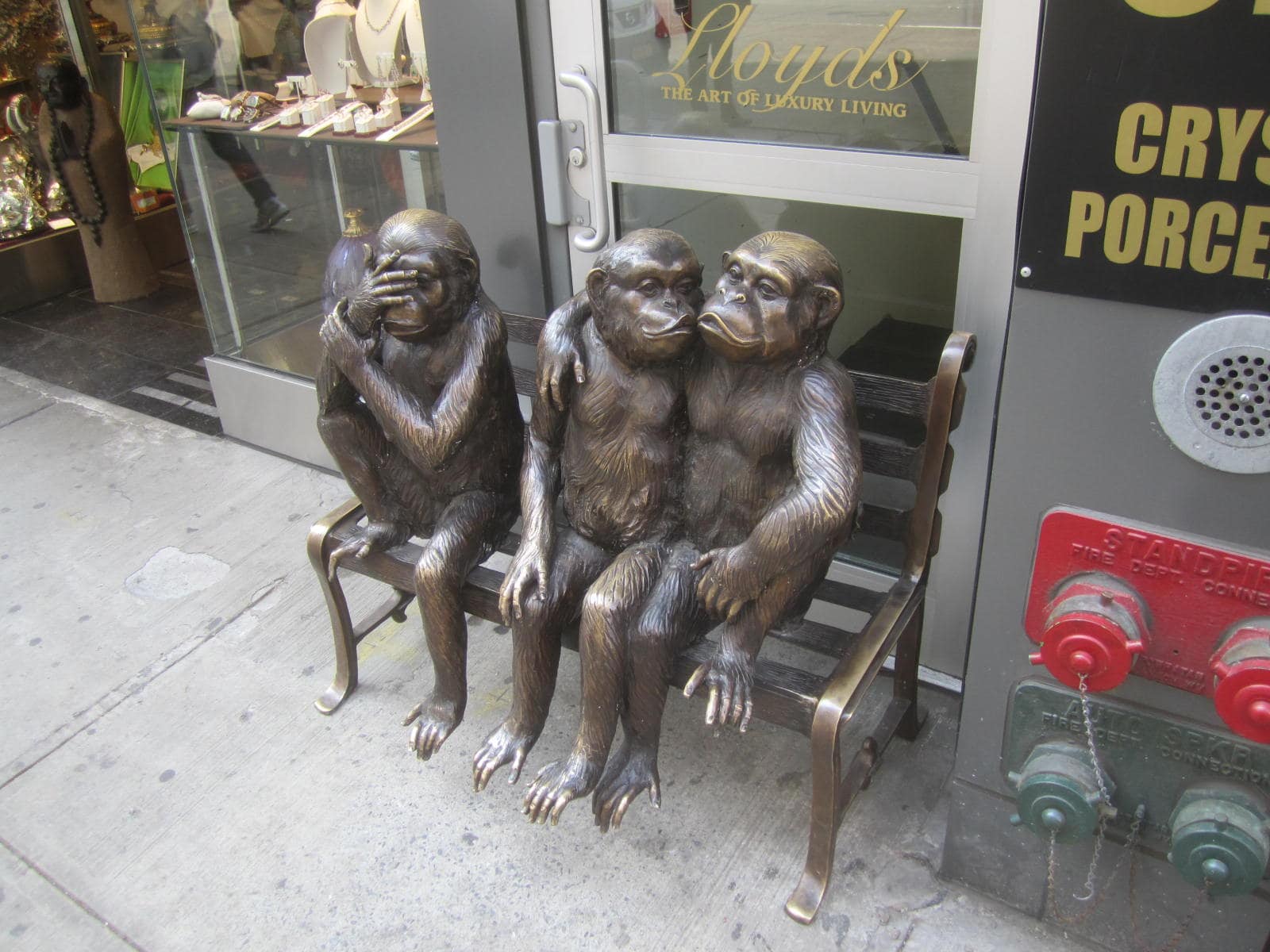Chip Off the Old Block
I have been blessed with two incredible parents. My respect for them knows no bounds. My big brown eyes lovingly look up to them in awe. Their disappointment in me would break my heart.
One of the hardest lessons I think someone learns in life, especially when they have such a deep respect for a parent(s), is that they are not a clone of their parent. Sure, there are many ways that you want your life to mirror theirs, but you can never be your parents.
One of the most troubling steps into adulthood can be drifting in a direction different than your parent’s direction. Discovering that you are your own person might just be that first step into adulthood.
Some children wander into adulthood much less troubled by the break away from their parents than I was. They are determined to be independent and nothing like their parents. God gives those parents the gifts of gray or falling hairs.
I completely understand an independent child who comes from an abusive, unloving, or overly bearing family. It is heartbreaking to see a child who fails to experience unselfish, loving eyes that adore him. A family that is too busy to help their child grow and encourage their potential misses so much joy, but the child itself misses that security of having someone always there to root for him.
It is the independent child, with some unknown determination, to do the opposite of whatever the parents would do that I have a hard time understanding. It’s not so much the child being different, or being their own person that bothers me. It’s more the selfish lack of respect they show the parent in order to prove who they are.
I think most good parents would encourage their children in their adventures. The problem sometimes occurs when the child flaunts their differences. Their ears seem to be closed to any advice their parents may lay at their feet.
When you read Presidential biographies, you really begin to understand why they react the way they do. Sometimes it is their upbringing. Parental upbringing or influence can often lead to them trying to “prove” they deserve a parent’s respect, approval, or even love. Sometimes, even after their parent(s) die, they keep trying to “prove” their worth.
Other Presidents had very rough childhoods and they seem to do everything it takes to not return there. That is one reason you probably see many Presidential kids have tragic lives. The President might have resented his parent’s firm discipline and his solution could mean no discipline for his own children. Without boundaries, these Presidential kids had no direction. Without direction, these kids never seem to be able to overcome the “you have it so much better than I did as a kid” lectures of their parents. These Presidential kids seem to go out of their way to prove they are their own person.
Other Presidents absolutely adored their parents. They usually carried the swagger of, “You mistreat one of my parents; you mistreat me. I will make sure you pay for that.” These kids often become very close to clones of their parents.
This President was one of those that absolutely adored his parents. When he became a young man himself, some would say he was a carbon copy of his father. Many might have considered that an insult, but not him. He took it as praise.
His father was a diplomat in Europe. His mother didn’t want to be stuck home with all the kids, so she sent him off with his father to Europe. In Europe, he received some of the best education in the world at the time. He would learn Latin, Greek, French, Dutch, German, and Italian.
He had a lot going for him. His father was a diplomat. He would meet famous people. He could speak, or at least understand many languages. It was only natural for him to step into his father’s shoes and become a diplomat himself. When he was just fourteen years old, he was off to Prussia to assist diplomat Francis Dana with his mission there.
He would also become a proficient writer. He would keep a diary for most of his adult life which he would frequently write in daily. He read and wrote poetry. He loved reading, especially the classics.
One of the “bad habits” he picked up while he was in Europe was going to the theater. He loved the theater. I know what you are thinking. You’re thinking, “Why would going to the theater be a bad habit?” Well, he was from a very religious family and region. Only sinners went to the theater. It was okay because he was in Europe, far, far away from his people ever seeing him enter a playhouse.
Like all good things, diplomats eventually get called home. His Dad’s mission ended and his Dad returned home. Then he was called home, too. He was just a little boy when he left and now he was returning home a man. He left the excitement of Europe and returned to the quietness of his hometown.
With some of the stories in the Bible, you just wish you knew the whole story of how some people’s path crossed other people’s paths and how they were chosen to end up in the Bible. All of a sudden a character pops on the stage. What type of family did he come from? What caused his life to be an example for so many future generations?
So begins the story of this unnamed character who walks on the stage in John 9. As we read down through the chapter we see that his parents are still alive. They recognize him, but he seems to look a little different. Was there a lapse in time or is their double-take on their son just because he looked different that day?
The young gentleman has a handicap; he is blind. Apparently unable to find work, he would come to the local “handicap” spot where other disadvantaged people would gather. Since this was in a time before “handicap” laws, this might have been the only way many of this unfortunate people could “earn” a living. They would beg for money and food.
Reading down a little further in the chapter, it seems that the young man’s family either forced him to conquer adulthood on his own, or they just realized there was nothing more they could do for him. It looks like he was left to figure things out on his own. And the Bible offers no hint, later in the chapter, whether he is pleased to see his parents when they are questioned about him.
Like any other day in his life, he was probably sitting in his special spot just waiting for someone to come by and help him with his “handicap.” Seems his solution for his dilemma was looking for compassionate individuals who would give him a handout of some kind. But on this day, things were going to turn out differently.
He heard the footsteps of a group of men coming in his direction. Before he is able to get his pleading speech out, they start talking among themselves. He decides to listen to their conversation instead of starting his routine.
There seems to be one member of the group that is the leader. His heart must sink when he hears their conversation. One of the members of the group asked the leader, “Who’s fault is it that he is blind? Is it the sins of his mom, his dad, or has he committed such a sin that has condemned him to this?” The strange thing is that the man offers no reply to his plight.
So early in the Bible, we start to hear people reasoning about their plight. The common question asked then, and now, is whose fault is it? Is it my parent’s fault or is this one of those things I have to step up and be a man about because it is my own doing?
He was so much like his father, it was scary. That’s especially scary when you know his father was the die-hard Federalist, John Adams. John Adams was rigid in his beliefs and sober in his expressions. Now there were two of them: John Adams and his son John Quincy Adams.
The Puritan glow that surrounded his Dad was something JQ Adams struggled with though. He was also not very fond of being a lawyer, the occupation of his father. But he became a lawyer anyway.
In the fall of 1792 some excitement came to John Quincy Adams and the city of Boston, where he was a lawyer. The theater was coming to Boston. JQ hadn’t seen a play performed since he left Paris. But there was a huge problem. Massachusetts had outlawed theatrical performances. Would he not get to see a show after all?
John Quincy Adams wasn’t the only one concerned about this law. Several other disappointed citizens formed the Boston Tontine Association. They tried to guilt the government into repealing the law by explaining to them that capitalism and real estate would boom from this new enterprise. They even built the Board Alley Theatre.
Massachusetts Governor, John Hancock (remember him from his big signature?) refused to repeal the law. Hancock would instruct attorney general, James Sullivan, to have the performances stopped. When they arrested an actor, a riot broke out. Now Hancock could use the Riot Act to put down the protesters, or the audience if you want to call them that.
At Faneuil Hall, a pro-theater group gathered to see if they could find a solution to their theater hungry appetite. It was decided that lawyer, John Quincy Adams, be appointed to a committee to request the governor’s assistance in enacting a repeal. Adams would even resort to writing under the pseudonym Menander in the Columbian Centinel to argue his points.
In 1793, the Massachusetts legislature repealed the anti-theater law. With that victory under his belt, John Quincy now had an audience and a voice. This would start the political career for a man who would be the first son of a President to become President himself.
Before Jesus actually heals the “handicapped” man of his blindness, He answers the question of who is to blame. Jesus answers, “No one is to blame. Sometimes situations are for God to show His awesome power.” What? I shouldn’t blame anyone. That doesn’t seem right.
But everyone else can see. But everyone else doesn’t get treated as bad as I do. But I didn’t do anything wrong. I try to play by the rules, but those evil people never seem to get punished for not playing by the rules. But…but…but…but…. No, God put you right where you are, right at this minute, for some reason. If you want to blame someone, blame Him.
Just a second, let’s just think about this before you fly off the handle and blame Him. Maybe instead of blaming Him, you should thank Him. He has chosen you to be part of His bigger plan. Your reaction to your condition is a reflection of your excitement about being part of His plan.
When Jesus healed the blind man, all the religious leaders were upset that Jesus did it on the Sabbath. Those church leaders grilled his family and friends. Then they turned their sights on the young man’s parents. His parents’ response? Feeling the pressure, and not wanting to stand up to the church leaders, they simply say, “He’s a big boy and he is responsible for his own actions.”
But my favorite part of the story is the blind man’s final response to the church leaders. Question after question, he tells them nothing but the truth. Finally, seemingly fed up with their questioning, he said something that seems to shut them up. He said, “I don’t know about all your “religious” stuff. All I know is that I was blind and now I see.”
When we become adults we often start blaming everyone and everything for our horrid conditions. It’s my parents’ fault. It’s my spouse’s fault. It’s my job’s fault. The simple fact of the matter is that it doesn’t really matter whose fault it is. What really matters is: what are you going to do about it? To me, it seems the more people find a place to rest the blame, the longer they will stay in their miserable condition. Taking action is far better than looking for excuses.
For the independent minded souls that feel they need to clear the air and shout their direction, especially when it is contrary to their loving parents, I suggest you be very respectful of your loving family’s life and beliefs. You may feel relief that you are devoted to your direction, and you may want to shout it at the top of your lungs, but you may break your biggest supporters’ hearts.
So what is one to do if they are not going to become a clone of someone else then? First, respect the opinions, even if you don’t agree with them, of those who love you. Second, surround your life with confidence. That one takes a lot of work. Third, don’t let someone else’s opinions drive your happiness. Fourth, and perhaps most important of all, always let God, and not your feelings, direct your path.
Prayer: Dear Mighty Father, Thank You for the great parents you gave me. Thank You for the little parts of each of them that are in me. Thank You that You have made me my own individual, though. Let others respect me for the person You want me to be and please help me to respect others’ right to be the person You want them to be. Amen.



